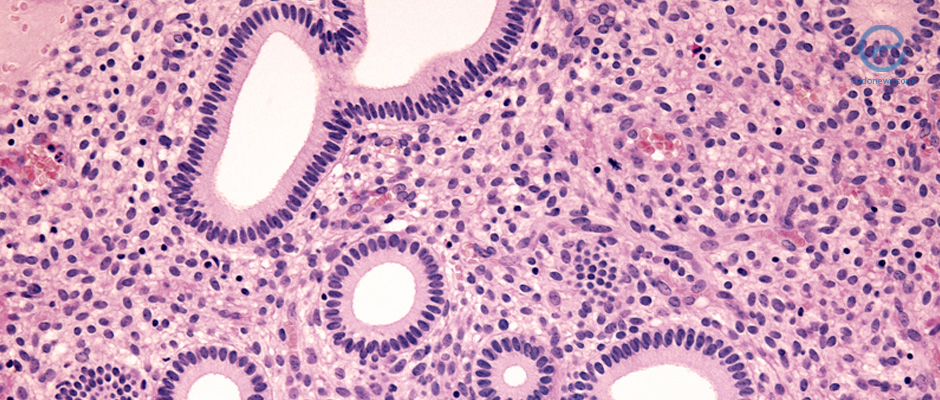CCL19/CCR7 Interaction can Casue Characteristic Cell Proliferation
Sep 21, 2017
The role of CCL19 and CCR7 in the proliferation, migration, and invasion of endometrial stromal cells (ESCs).
Key Points
Highlights:
- This study hopes to elucidate the mechanism by which CCL19 [a chemokine found in peritoneal fluid (PF)], and CCR7 [a chemokine receptor, cause endometrial stromal cell (ESC) proliferation and invasion]. In a general sense, the authors hope to uncover the role of CCL19/CCR7 doublet in the pathogenesis of endometriosis.
Importance:
- It is important to understand the mechanism(s) that underlie(s) endometriosis disease progression to allow researchers for creating targeted treatments for individuals suffering from the disease.
What’s done here?
- The researchers recruited 38 women with endometriosis and 32 women without endometriosis.
- Of the 38 women with endometriosis, 21 women had milder forms of the illness whereas the remaining 17 had more severe forms of endometriosis.
- Each participant provided tissue and PF during their proliferative/follicular phase.
- Enzyme-linked immunosorbent assay (ELISA) was used in conjunction with immunohistochemistry (IHC) to analyze CCL19 and CCR7 in the PF and endometrium of the participants.
- Reverse transcriptase PCR analysis and western blot were used to determine the expression of various proteins and mRNAs. Western blot was used to analyze levels of MMP2, MMP9, Bcl2, unphosphorylated Akt and phosphorylated Akt.
- Transwell and cell proliferation assays were used to see ESC migration, proliferation, and invasion.
- Statistical analysis was conducted on the quantitative data to determine significance.
Key results:
- CCL19 expression was increased in women with endometriosis and the level corresponded with the severity of the disease.
- CCL19 and CCR7 expression were higher in the endometrium of women with endometriosis compared to those without.
- The results show that CCL19 interacts with CCR7 using the PI3K/Akt signaling cascade. This interaction subsequently leads to the increased production of ESCs and increased phosphorylation of Akt, Bcl2, MMP9, and MMP2 within these cells.
- Estradiol at high concentrations was shown to increase CCL19 activity and ESC proliferation, whereas progesterone decreased.
Limitations of the study:
- The study looked at the molecular process in vitro, performed in an artificial environment of the culture dish, rather than in vivo, within the organism.
- There may be different reasons to alter the cytokines and their receptor levels in the body for every individual to affect the levels, which are hard to control.
Lay Summary
In their paper published in the American Journal of Reproductive Immunology titled “CCL19/CCR7 contributes to the pathogenesis of endometriosis via PI3K/Akt pathway by regulating the proliferation and invasion of ESCs,” Diao et al. hope to elucidate one of the mechanisms that contribute to the pathogenesis of endometriosis. The authors believe that the answer can be found in the endometrium and peritoneal fluid (PF). It is hypothesized that CCL19, a chemokine, in the PF and CCL19/CCR7 found within the endometrium may play a role in the unwanted cell proliferation that is characteristic of endometriosis.
The researchers used a variety of laboratory methods to test their claim. The subjects for this study included 38 women with and 32 women without endometriosis. PF and endometrial tissues collected from each participant. Enzyme-linked immunosorbent assay (ELISA) was used in conjunction with immunohistochemistry to quantify CCL19/CCR7 levels. Cell proliferation levels were detected using cell proliferation and transwell invasion assays. Western blot analysis was used to detect expression levels of the following genes: MMP9, MMP2, Bcl2, phosphorylated Akt and unphosphorylated Akt. The researchers conducted a Reverse Transcriptase PCR analysis.
Similar to other studies, the results of this study show that CCL19 is found in higher quantities in the PF of women with endometriosis. Additionally, expression of CCL19 in the PF corresponded with the severity of the disease. In other words, women with more severe endometriosis tended to have higher levels of CCL19 in their PF than women with mild endometriosis. Furthermore, there was more CCL9 and CCR7 in the endometrium of women with endometriosis. The increase in both CCL9 and CCR7 hints at a potential interaction between the chemokine and receptor. In fact, the study later reveals that CCL19 activates the PI3K/Akt signaling cascade, which then leads to CCR7 activation that ultimately results in invasive endometrial stromal cell (ESC) proliferation. In addition to increased cell proliferation, the CCL9/CCR7 interaction affects the phosphorylation of MMP9, MMP2, Bcl2, and Akt. The researchers also looked at the effects of estradiol and progesterone on CCL19 activity. Results show that high concentrations of estradiol increase CCL19 activity and subsequent ESC production, whereas progesterone decreases CCL19 activity and ESC production.
Research Source: https://www.ncbi.nlm.nih.gov/pubmed/28856757
CCL19 CCR7 Chemokine cell proliferation ESC Akt MMP2 MMP9 Bcl2 estradiol progesterone cytokines

